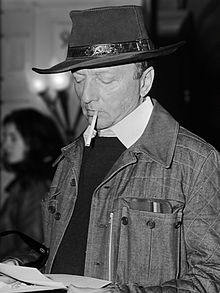Harold Robbins
Harold Robbins (born May 21, 1916 in New York as Harold Rubin, † October 14, 1997 in Palm Springs , California ) was an American writer .
Life
Robbins was a son of Russian and Polish immigrants. After graduating from high school , Robbins worked in numerous jobs to eventually land in Hollywood and got work at Universal Studios . His work in film shaped many of his later novels. But first he published his first novel in 1948. Never love a stranger is the story of an orphan who grows out of nowhere into a successful gangster in New York City. Robbin's strong language is already evident on his debut, making him one of the best-selling authors of exciting entertainment literature and ensuring that his books are made into films by Hollywood, but despised by literary critics.
Never love a stranger was his first book, which was made into a film by Robert Stevens in 1958, starring John Drew Barrymore (father of actress Drew Barrymore ).
In 1949 his second book, The Dream Merchants, was published . This was to be his first preoccupation with the Hollywood dream factory. It consists of a mixture of personal experiences with Hollywood, historical facts from the beginnings of the talkie and sex and crime . Knitted according to this pattern, numerous novels appeared until his death, all of which became bestsellers . Harold Robbins' sold editions - estimated at over 750 million copies worldwide - led him to say he was the best writer in the world.
Its probably most ambitious work is his third book A Stone for Danny Fisher (dt .: The Merciless ), the story of a boy growing up in New York of the Great Depression . In 1958, this novel was used as a template for a musical that became a global success under the title My Life is Rhythm (King Creole) with Elvis Presley in the lead role. For the film, the plot was changed slightly and moved to New Orleans .
Harold Robbins was married five times and was dependent on a wheelchair from 1982 due to a hip problem. He published his last novel, Tycoon , in 1997, the year he died.
Works
- The wild. OT: Never Love a Stranger. 1948. Translated by Maria Meinert
- Dream factory. OT: Dream Merchants. 1949. Translated by Gertrud Pöhl, alias dreams, women and finance
- The merciless. OT: Stone for Danny Fisher. 1952. Translated by Pia von Hartungen, alias A stone for Danny Fisher
- The managers. OT: Never Leave Me. 1953. Translated by Wolf Hackenberg
- The moralists. OT: 79 Park Avenue. 1955. Translated by Werner von Grünau
- The professionals. OT: Stiletto. 1960. Translated by Arno Dohm, alias Stiletto
- The Insatiable. OT: Carpetbaggers. 1961. Translated from Herbert Roch
- Where love leads OT: Where Love Has Gone. 1962. Translated by Maria von Schweinitz, alias Die Verführten
- The playboys. OT: Adventurers. 1966. Translated by Willy Thaler
- The bosses. OT: Inheritors. 1969. Translated by Willy Thaler
- The clan. OT: Betsy. 1971. Translated by Willy Thaler
- The pirate. OT: Pirate. 1974. Translated by Willy Thaler
- The longing. OT: Lonely Lady. 1976. Translated by Günter Panske
- Dreams. OT: Dreams Die First. 1977. Translated by Günter Panske
- The climbers. OT: Memories of Another Day. 1979. Translated by Günter Panske
- Goodbye, Janette. OT: Goodbye Janette. 1981. Translated by Günter Panske
- Hollywood. OT: storyteller. 1982. Translated by Wilhelm Hartmann
- The soul catcher. OT: Spellbinder. 1983. Translated by Wolf Tanneberger
- The immortals. OT: Descent from Xanadu. 1984. Translated by Wolf Tanneberger
- Piranhas. OT: Piranhas. 1986. Translator K. Schatzhauser
- The speculators. OT: Raiders. 1994. Translated by Gerhard Beckmann, continuation of Die Unersättlichen
- The desirable. OT: Stallion. 1996. Translated by Wilhelm Michael Riegel, continuation of Der Clan
- The makers. OT: Tycoon. 1997. Translated by Wilhelm Michael Riegel
Film adaptations
- 1958: Gangster King of New York (Never Love a Stranger) - Director: Robert Stevens; Actors: John Drew Barrymore , Steve McQueen
- 1958: My Life is the Rhythm (King Creole) - Director: Michael Curtiz ; Actors: Elvis Presley , Walter Matthau
- 1966: Nevada Smith - Director: Henry Hathaway ; Cast: Steve McQueen , Karl Malden ; based on the book Carpetbaggers
- 1969: Stiletto - directed by Bernard Louis Kowalski; Actor Alex Cord , Britt Ekland
- 1969: Playboys und Abenteurer (The Adventurers) - Director: Lewis Gilbert ; Actors: Charles Aznavour , Candice Bergen
- 1978: The Clan - Director: Daniel Petrie ; Actors: Laurence Olivier , Tommy Lee Jones
- 1978: The Pirate - Director: Ken Annakin ; Cast: Christopher Lee , Armand Assante ; TV movie
- 1980: Dream Merchants - Director: Vincent Sherman ; Actors: Mark Harmon , Vincent Gardenia ; two-part miniseries
- 1983: A career through all beds (The Lonely Lady) - Director: Peter Sasdy ; Actors: Pia Zadora , Lloyd Bochner
literature
- Andrew Wilson: Harold Robbins. The Man Who Invented Sex. Bloomsbury, London 2007, ISBN 978-0-7475-9265-5 .
Web links
- Literature by and about Harold Robbins in the catalog of the German National Library
- Harold Robbins in the Internet Movie Database (English)
| personal data | |
|---|---|
| SURNAME | Robbins, Harold |
| ALTERNATIVE NAMES | Rubin, Harold (maiden name) |
| BRIEF DESCRIPTION | American writer |
| DATE OF BIRTH | May 21, 1916 |
| PLACE OF BIRTH | new York |
| DATE OF DEATH | October 14, 1997 |
| Place of death | Palm Springs , California , USA |
